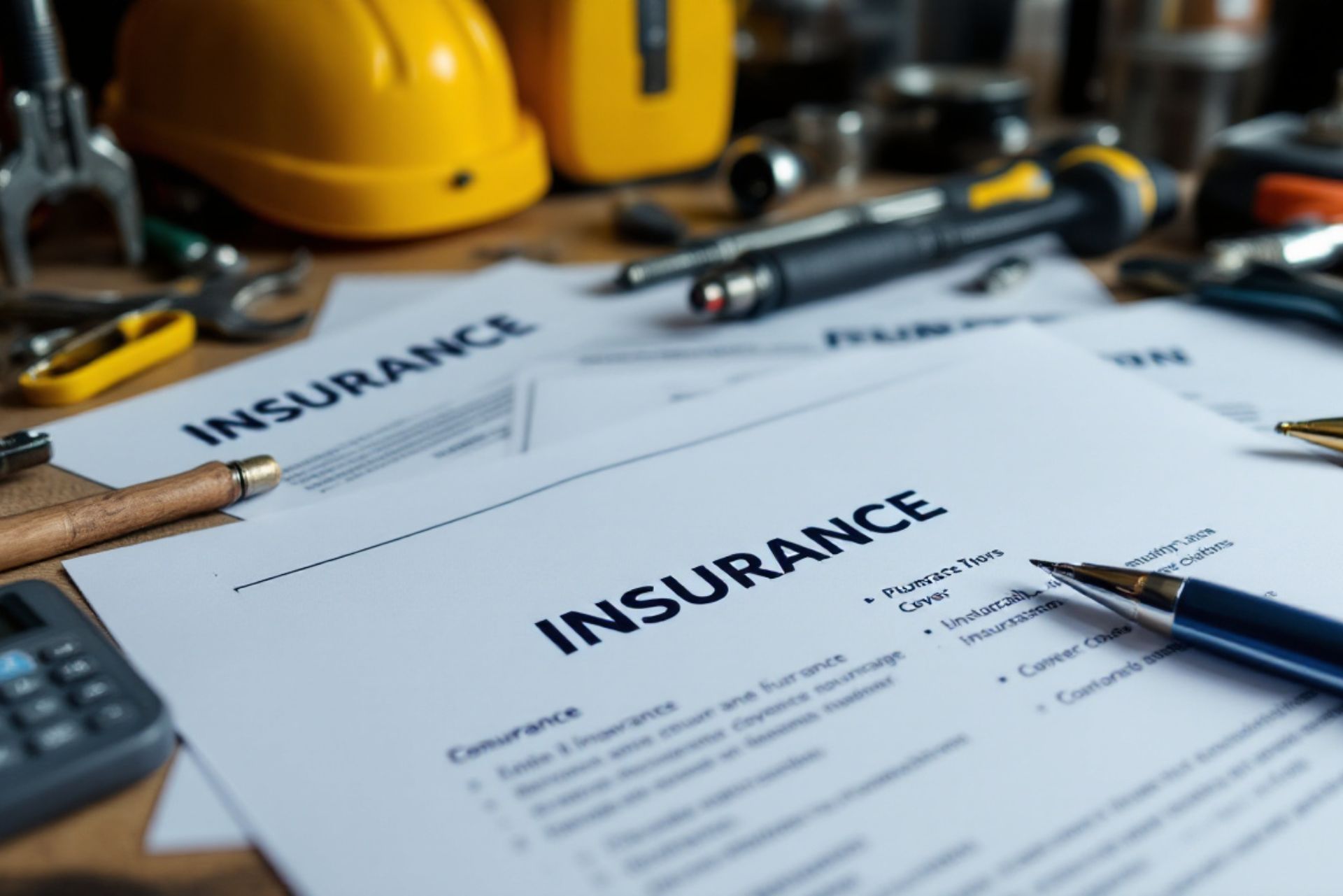Index
Contact Us
Phone
Location
Simi Valley, CA 93065
The Woodlands, TX 77382
Katy, TX 77494
As a commercial plumber, you face unique challenges and risks every day. From working on large-scale plumbing systems in commercial buildings to dealing with high-pressure situations, the potential for accidents and liabilities is significant. This is where commercial plumber insurance comes into play. Understanding the ins and outs of this type of insurance is crucial for protecting your business and ensuring long-term success. In this article, we will explore everything you need to know about commercial plumber insurance, including its importance, types of coverage, costs, and tips for choosing the right policy.
Why Commercial Plumber Insurance is Essential
Running a plumbing business is not just about fixing leaks and installing pipes; it involves managing various risks that can lead to significant financial losses. Here are a few reasons why having commercial plumber insurance is essential:
Protection Against Liability Claims
One of the primary reasons to invest in commercial plumber insurance is to protect yourself against liability claims. If a client or third party suffers injury or property damage due to your work, they may hold you liable. Without insurance, you could face substantial legal fees and compensation costs that could cripple your business. Moreover, even if you believe you’ve done everything right, accidents can happen, and a simple oversight can lead to costly claims. Having comprehensive liability coverage not only safeguards your finances but also enhances your credibility with clients, showing them that you take your responsibilities seriously.
Coverage for Property Damage
As a plumber, you often work in commercial properties that may be damaged during your operations. Whether it’s a burst pipe causing water damage or accidental damage to fixtures, having insurance ensures that you can cover repair costs without jeopardizing your financial stability. This coverage extends beyond immediate repairs; it can also include the costs associated with business interruption, allowing you to maintain your operations even when faced with unexpected setbacks. Additionally, many commercial insurance policies offer protection against theft or vandalism, which can be particularly important for businesses that store expensive equipment on-site.
Employee Protection
In the plumbing industry, employees are exposed to various risks, from injuries on the job to illnesses caused by exposure to hazardous materials. Workers’ compensation insurance, a crucial part of commercial plumber insurance, provides medical benefits and wage replacement for employees injured while performing their duties. This not only fosters a safer work environment but also boosts employee morale, as workers feel valued and protected. Furthermore, having robust employee protection can help you attract top talent in a competitive market, as prospective employees are more likely to choose a company that prioritizes their health and safety.
Equipment and Tools Coverage
Plumbers rely heavily on a variety of tools and equipment to perform their jobs effectively. From pipe wrenches to high-tech diagnostic machines, the cost of these items can add up quickly. Commercial plumber insurance often includes coverage for tools and equipment, protecting your investments against theft, loss, or damage. This means that if your tools are stolen from a job site or damaged during transport, you won’t have to bear the financial burden alone. Additionally, some policies may offer rental reimbursement for equipment while your own is being repaired, ensuring that your business can continue to operate smoothly without significant downtime.
Business Continuity and Peace of Mind
Having commercial plumber insurance is not just about protecting against immediate risks; it also plays a vital role in ensuring long-term business continuity. In the event of a major incident, such as a lawsuit or significant property damage, having insurance can mean the difference between bouncing back quickly and facing prolonged financial hardship. This peace of mind allows you to focus on what you do best—providing excellent plumbing services—without the constant worry of potential liabilities hanging over your head. Additionally, many insurance providers offer resources and support to help you implement risk management strategies, further enhancing your ability to run a successful plumbing business.

Types of Commercial Plumber Insurance Coverage
Commercial plumber insurance is not a one-size-fits-all solution. There are several types of coverage available, each designed to address specific risks associated with the plumbing profession. Understanding these types can help you choose the right policy for your business.
General Liability Insurance
General liability insurance is a foundational coverage for any plumbing business. It protects against claims of bodily injury, property damage, and personal injury that may arise from your services. For instance, if a client slips and falls on a wet floor after you’ve completed a job, this insurance can cover medical expenses and legal fees. Additionally, this coverage can also protect your business from claims related to advertising injuries, such as copyright infringement or slander, which can occur if your marketing materials unintentionally misrepresent your services or those of a competitor.
Professional Liability Insurance
Also known as errors and omissions insurance, professional liability insurance protects you against claims of negligence or failure to deliver services as promised. If a client claims that your work caused financial loss or damage due to a mistake, this coverage can help defend you in court and pay for any settlements. This type of insurance is particularly important in plumbing, where the consequences of a miscalculation can lead to significant property damage or health hazards, such as water contamination. By having this coverage, you can reassure your clients that you take your professional responsibilities seriously and are prepared to address any issues that may arise.
Workers’ Compensation Insurance
Workers’ compensation insurance is mandatory in most states and is vital for protecting your employees. It covers medical expenses and lost wages for employees who are injured or become ill as a result of their job. This not only protects your workers but also shields your business from potential lawsuits related to workplace injuries. Furthermore, having workers' compensation insurance can enhance your company's reputation, as it demonstrates your commitment to employee safety and well-being. In an industry where physical labor is prevalent, this coverage can be a deciding factor for potential employees when choosing where to work.
Commercial Auto Insurance
If your plumbing business uses vehicles to transport tools and employees, commercial auto insurance is essential. This coverage protects against accidents and damages involving company vehicles, ensuring that you’re not left with hefty repair bills or liability claims from accidents. Moreover, commercial auto insurance can also provide coverage for theft of tools or equipment stored in your vehicles, which is a common concern for plumbers who often carry expensive machinery and supplies. This added layer of protection can be invaluable, as it helps safeguard your investment and ensures that your business can continue to operate smoothly even in the face of unexpected setbacks.
Cost of Commercial Plumber Insurance
The cost of commercial plumber insurance can vary widely based on several factors, including the size of your business, the types of coverage you need, and your location. Understanding these factors can help you budget for insurance and find the best rates.
Factors Influencing Insurance Costs
Several factors can influence the cost of your insurance premiums:
- Business Size: Larger businesses with more employees and higher revenue typically pay higher premiums.
- Claims History: If your business has a history of claims, insurers may view you as a higher risk, leading to increased costs.
- Coverage Types: The more coverage you choose, the higher your premiums will be. It’s essential to balance adequate coverage with affordability.
- Location: Insurance costs can vary by region due to different regulations and risk levels associated with specific areas.
Average Premiums
On average, commercial plumber insurance can range from $500 to $3,000 per year, depending on the coverage types and business specifics. General liability insurance tends to be the most affordable, while professional liability and workers’ compensation insurance can add to the total cost.
Ways to Save on Insurance Costs
While insurance is a necessary expense, there are ways to save on premiums:
- Bundle Policies: Many insurers offer discounts for bundling multiple types of coverage, such as general liability and commercial auto insurance.
- Maintain a Clean Claims History: Reducing the number of claims you file can help keep your premiums lower over time.
- Increase Deductibles: Opting for higher deductibles can lower your premium, but ensure you can afford the out-of-pocket expenses in case of a claim.
Additionally, investing in safety training for your employees can significantly impact your insurance costs. Insurers often reward businesses that prioritize safety with lower premiums, as a well-trained workforce is less likely to experience accidents or injuries. Implementing regular safety drills and providing ongoing education about best practices in plumbing can not only enhance your team's skills but also demonstrate to insurers that you are committed to minimizing risk.
Another effective strategy is to regularly review and update your insurance policy. As your business grows or changes, your insurance needs may evolve as well. By staying proactive and communicating with your insurance agent about any changes in your operations, you can ensure that you have the right coverage in place without overpaying for unnecessary policies. This ongoing dialogue can also help you stay informed about new discounts or coverage options that may be available, further optimizing your insurance expenses.
How to Choose the Right Commercial Plumber Insurance
Choosing the right insurance for your plumbing business can be daunting, but taking a systematic approach can simplify the process. Here are some steps to help you make an informed decision:
Assess Your Risks
Start by assessing the specific risks associated with your plumbing business. Consider the types of projects you undertake, the number of employees you have, and the potential liabilities you face. This assessment will help you determine the types and amounts of coverage you need. For example, if you frequently work on large commercial projects, you may face higher risks of property damage or bodily injury, which would necessitate higher liability coverage. Additionally, think about the tools and equipment you use; if they are expensive or specialized, you might want to consider coverage for equipment breakdown or theft.
Research Insurance Providers
Not all insurance providers are created equal. Research different companies, read reviews, and compare their policies. Look for insurers with experience in the plumbing industry, as they will better understand your unique needs and risks. Pay attention to their claims process and customer service ratings, as these factors can significantly impact your experience when you need to file a claim. A provider with a solid reputation for handling claims efficiently can save you time and stress in the long run, allowing you to focus on your business rather than navigating complex insurance issues.
Get Multiple Quotes
Once you have a list of potential insurers, request quotes from each. This will give you a clearer picture of the costs involved and allow you to compare coverage options. Don’t just focus on the price; consider the coverage limits, exclusions, and overall value of each policy. Some insurers may offer additional services, such as risk management consultations or safety training, which can be beneficial for your business. Make sure to ask about any discounts for bundling policies or for having a good safety record, as these can significantly reduce your premiums.
Consult with an Insurance Agent
If you’re feeling overwhelmed, consider consulting with an insurance agent who specializes in commercial insurance for plumbers. They can provide valuable insights, help you navigate the complexities of different policies, and ensure you get the best coverage for your needs. An experienced agent can also help you understand the nuances of each policy, such as how deductibles work and what specific incidents are covered. Furthermore, they can assist you in tailoring your coverage as your business grows or changes, ensuring that you remain adequately protected against emerging risks in the plumbing industry.

Common Exclusions in Commercial Plumber Insurance
While commercial plumber insurance offers vital protection, it’s essential to be aware of common exclusions that may apply to your policy. Understanding these exclusions can help you avoid surprises when filing a claim.
Pre-existing Conditions
Insurance policies often exclude coverage for pre-existing conditions or issues that were known before the policy was purchased. For example, if you were aware of a plumbing issue before starting work, any damage related to that issue may not be covered. This exclusion emphasizes the importance of thorough inspections and honest disclosures during the underwriting process. Plumbers should document any existing problems and address them before seeking insurance, as this proactive approach can save significant costs in the long run.
Intentional Acts
Insurance will not cover damages resulting from intentional acts or gross negligence. If a claim arises from willful misconduct or reckless behavior, you may find yourself without coverage. This exclusion serves as a reminder for plumbers to adhere to safety protocols and industry standards. Engaging in shortcuts or ignoring safety regulations not only jeopardizes your insurance coverage but also puts your reputation and livelihood at risk. Maintaining a commitment to ethical practices not only protects your business but also fosters trust with clients.
Wear and Tear
Normal wear and tear on plumbing systems is generally not covered under commercial plumber insurance. Policies typically cover sudden and accidental incidents rather than gradual deterioration. This distinction is crucial for business owners to understand, as it highlights the importance of regular maintenance and inspections. Implementing a routine maintenance schedule can help identify potential issues before they escalate, ultimately saving time and money. Additionally, educating clients about the expected lifespan of plumbing components can help manage their expectations and encourage them to invest in preventative measures.
Conclusion
Commercial plumber insurance is a critical component of running a successful plumbing business. By understanding the importance of this insurance, the types of coverage available, and how to choose the right policy, you can protect your business from unforeseen risks and liabilities. Remember to assess your unique needs, research providers, and consult with professionals to ensure you have the best coverage for your specific situation.
Investing in commercial plumber insurance not only safeguards your business but also provides peace of mind, allowing you to focus on what you do best: delivering high-quality plumbing services to your clients. Don't wait until it's too late; secure the right insurance today and build a solid foundation for your plumbing business's future.
Types of Plumber Insurance We Provide
Areas we serve




